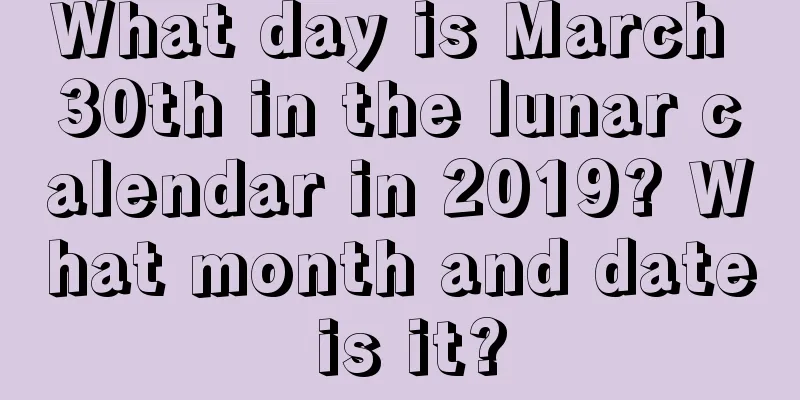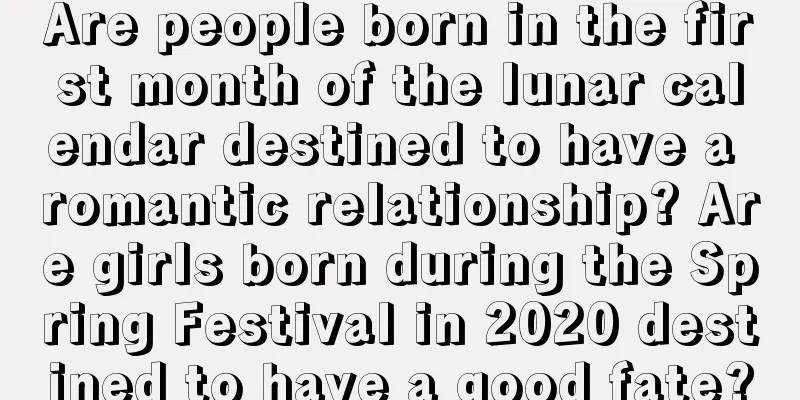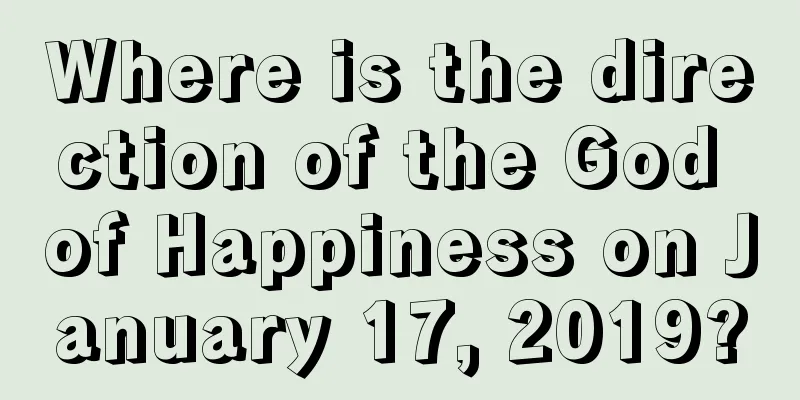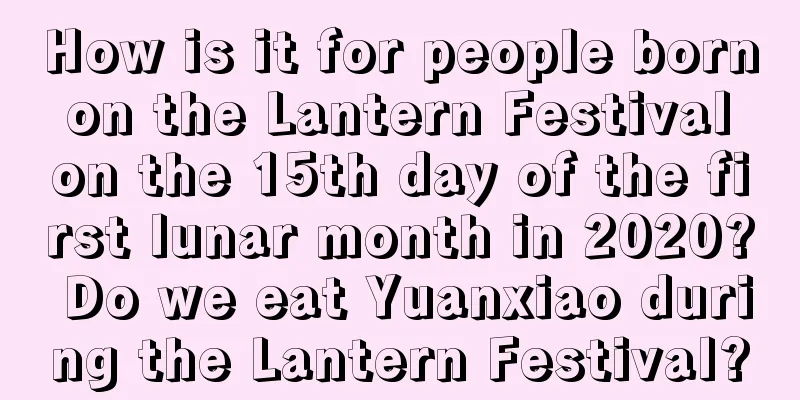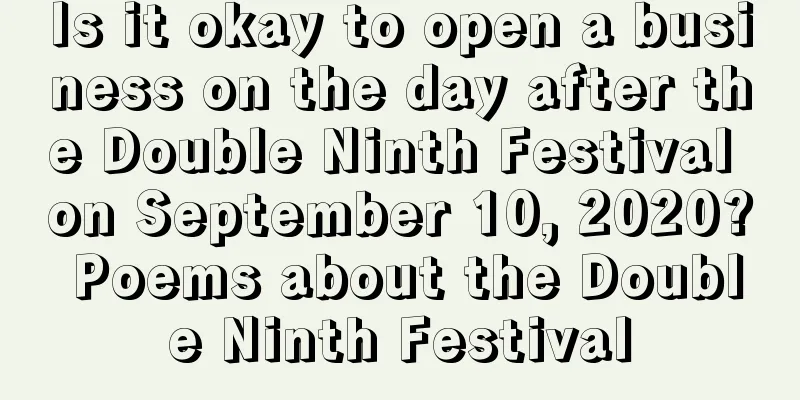What is the origin of New Year’s Day? Is New Year's Day a legal holiday?
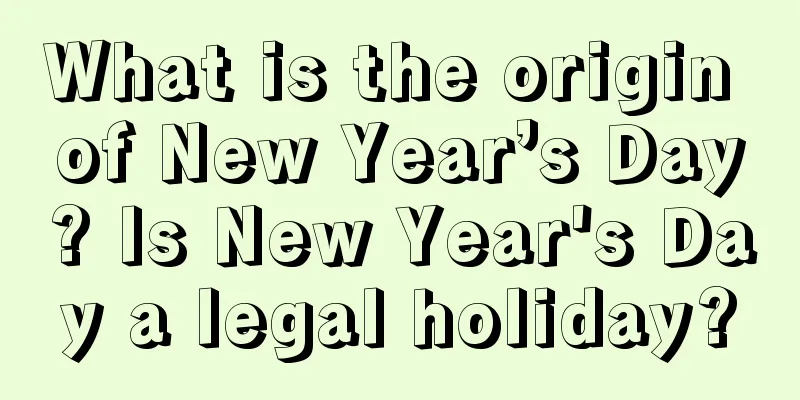
New Year's Day means the beginning of the new year and has a very important significance. So what is the origin of New Year's Day? Is New Year's Day a legal holiday? Let’s take a look at the following content!What is the origin of New Year’s Day?When it comes to New Year's Day, many people generally think of it as a holiday. It is a legal holiday in various countries and a day when people can take a break from work. Relevant experts said that in fact, the term "New Year's Day" has been used in China for more than 4,000 years.The original origin The word "New Year's Day" is a "native product" of ancient China. In the Xia Dynasty of China, the "Xia calendar" was created, which is now the "Lunar calendar", and it is stipulated that the first day of the first lunar month is "New Year's Day". Quote from classics The word "New Year's Day" first appeared in the poem "Book of Jin": "Emperor Zhuanxu took the first month of summer as the beginning, which was actually the spring of the New Year's Day." During the Northern and Southern Dynasties, the Southern Dynasty historian Xiao Ziyun also recorded in his poem "Jie Ya" "Four seasons new New Year's Day, longevity early spring morning". In the Song Dynasty, Wu Zimu's "Dream of the Red Chamber" Volume 1 "The First Month" entry reads: "The first day of the first month is called Yuandan, commonly known as the New Year. This is the first of the festivals in a year."; in the Han Dynasty, Cui Yuan's "Three Hairpin Inscription" called it "Yuanzheng"; in the Jin Dynasty, Yu Chan's "Ode to Yangdu" called it "Yuanchen"; in the Northern Qi Dynasty's "New Year's Day Grand Festival Song Huangxia Ci" called it "Yuanchun"; in the Tang Dynasty's Dezong Li Shi's "New Year's Day Retreat to Watch the Army Return to the Camp" called it "Yuanshuo" In Chinese, "New Year's Day" is a compound word. "Yuan" means "beginning" and "Dan" refers to dawn or morning. The pictograph of "旦" already appeared on bronze vessels during the Shang Dynasty. There is a "日" above "旦", which means a round sun; and a "一" below it, which means the horizon. "日" and "一" together mean the sun jumps out of the horizon and rises slowly in the east. The ancients created the word "New Year's Day", which has beautiful meaning, ingenious and exquisite. Is New Year's Day a legal holiday?YesNew Year's Day is January 1st of the Gregorian calendar every year, and national statutory holidays refer to the days when the state stipulates holidays. The statutory holidays in our country are Spring Festival, Tomb-Sweeping Day, Labor Day, Dragon Boat Festival, Mid-Autumn Festival and National Day. Among them, the four statutory holidays of Spring Festival, Qingming Festival, Labor Day and National Day have high fees. But the highway is not free on New Year's Day. |
Recommend
What are the customs and taboos for the 21st day of the twelfth lunar month in 2018?
Introduction: There are 365 days in a year, and ea...
What is the fate of a pig born in November of the lunar calendar? What is the fate of the 12 zodiac signs born in November of the lunar calendar?
Introduction: The numerology of people born in dif...
What are the do's and don'ts on the third day of the second lunar month in 2019?
If you want to know more about the second month o...
Why do we need to use moxibustion on Guanyuan during the dog days of summer?
One of the major methods of maintaining health dur...
Is the lunar calendar date for Mid-Autumn Festival in 2019 suitable for picking up the car? Can pears be given as gifts during Mid-Autumn Festival?
Introduction: The days of the Mid-Autumn Festival ...
Is the second day of the fifth lunar month in the Year of the Tiger 2022 an auspicious day for a haircut?
Young people nowadays basically have no habit of c...
Is it auspicious to move house on the 30th day of the first lunar month in 2022? What's the omen for this day?
The first month of the lunar calendar is also know...
What are the good and bad luck on the sixth day of the first lunar month in 2020? Is it an auspicious day?
Every day has its good and bad days, and the sixth...
What are the auspicious days for travel in April of the lunar calendar in 2018?
As the cold winter passes, we are gradually welcom...
What will April Fool’s Day be like on March 1, 2022? Is this day suitable for traveling?
The third month of the lunar calendar is warm and ...
What is the zodiac sign of a rat baby born on September 11, 2020? What is the zodiac sign of a rat baby born in September this year?
Introduction: New life is born every month, and ch...
Is September 19th of the lunar calendar 2020 an auspicious day for getting a haircut?
In life, when it comes to haircuts, people only ge...
What month is April in the lunar calendar of 2020? What are the good days in April in the lunar calendar?
Introduction: Different days have good and bad luc...
The most detailed list of auspicious days for haircuts in May of the lunar calendar in 2018
Introduction: The hot summer is coming, and the fi...
Is the 29th day of the first lunar month in 2022 an auspicious day? How are you doing?
The good and bad of each day in the lunar calendar...


